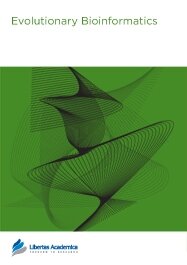

Publication Date: 20 Feb 2012
Type: Original Research
Journal: Evolutionary Bioinformatics
Citation: Evolutionary Bioinformatics 2012:8 139-150
doi: 10.4137/EBO.S8897

Molecular techniques that assess biodiversity through the analysis of a small segment of mitochondrial genome have been getting wide attention for inferring the mammalian diversity. Due to their highly conserved nature, specific mitochondrial genes offer a promising tool for phylogenetic analysis. However, there is no established criteria for selecting the typical mitochondrial DNA (mtDNA) segments to achieve a greater resolving power. We therefore chose the family Bovidae as a model and compared the tree-topologies resulting from the commonly used and phylogenetically-informative genes including 16S rRNA, 12S rRNA, COI, Cyt b and D-loop with respect to complete mitochondrial genome. The tree topologies from the whole mitochondrial genome of 12 species were not identical albeit similar with those resulting from the five individual genes mentioned above. High bootstrap values were observed for mtDNA compared with that of any single gene. The average pair-wise sequence divergence using different genetic modes was found to be: D-loop (0.229) > Cyt b (0.159) > COI or complete mtDNA (0.143) > 12S rRNA (0.094) > 16S rRNA (0.091). The tree resulting from complete mtDNA clearly separated the 12 taxa of Bovidae into 3 major clusters, one cluster each for subfamily Cervinae and Bovinae and the third cluster comprised the distinctive clades of Caprinae and Antilopinae. However, jumping clades of Antilopinae were observed while using the individual genes. This study showed that Bison bison and Bos Taurus have very close phylogenetic relationship compared to Bubalus bubalis (Bovinae), irrespective of the method used. Our findings suggest that complete mtDNA genome provides most reliable understanding of complex phylogenetic relationships while the reliability of individual gene trees should be verified with high bootstrap support.
PDF (676.79 KB PDF FORMAT)
RIS citation (ENDNOTE, REFERENCE MANAGER, PROCITE, REFWORKS)
BibTex citation (BIBDESK, LATEX)
XML
PMC HTML
This is the fastest progress we have experienced from submission to acceptance. Reviews are fast, pertinent, and instructive. Every step of the process is visible and prompt, and every email is friendly and immediate. In all, it is an excellent experience to be published in Libertas Academica.

All authors are surveyed after their articles are published. Authors are asked to rate their experience in a variety of areas, and their responses help us to monitor our performance. Presented here are their responses in some key areas. No 'poor' or 'very poor' responses were received; these are represented in the 'other' category.See Our Results
Copyright © 2013 Libertas Academica Ltd (except open access articles and accompanying metadata and supplementary files.)
Facebook Google+ Twitter
Pinterest Tumblr YouTube